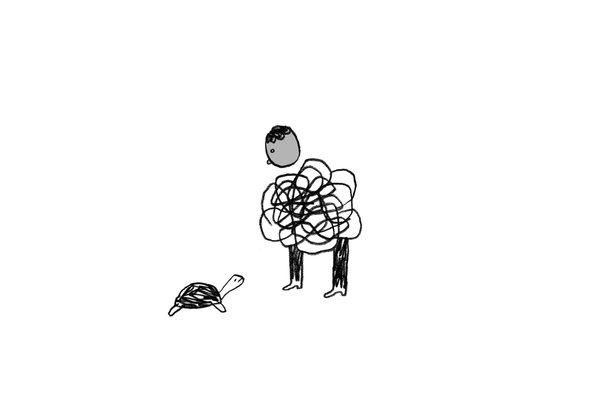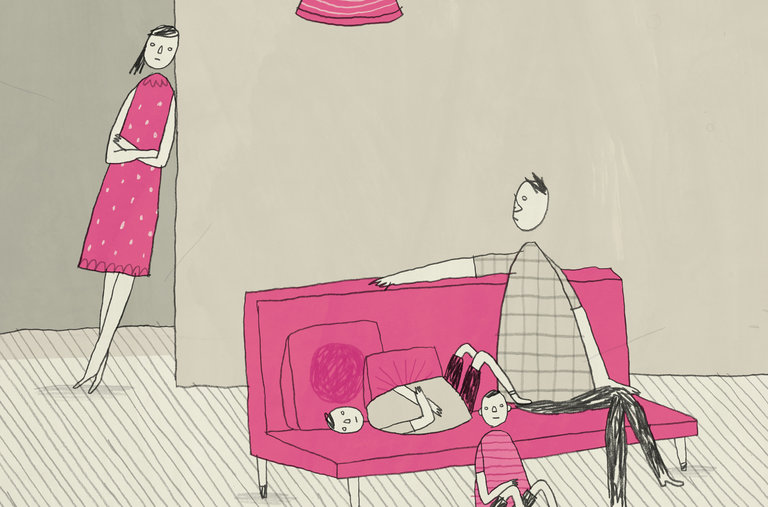One of the greatest joys of my life is watching the British reality television program “Love Island,” a daily show in which six men and six women are placed in a luxury island villa, filmed constantly and encouraged to fall in love. The couple that wins the heart of the United Kingdom wins 50,000 British pounds. The concept is admittedly shallow and heteronormative, verging on dystopian.
I did not miss an episode of “Love Island” during last summer’s blistering heat wave, the summer my life turned upside down. It didn’t matter how late I got home or how terrible I felt. When I was especially tired or lonely I often fell asleep watching it and, upon waking, would prod my laptop to life to see what I had missed — an easing out of one day and into the next, in the spaces I would have been chatting with my partner, Chris. That summer, the pillow where his head normally lay was empty.
Within a week of seeing the first episode, I had ordered a personalized “Love Island” water bottle and began sharing knowing looks with others on the bus or subway when I drank from it. Our glances were a sort of communion.
The media reported that rates of inquiries into plastic surgery soared after the series started, and I was not immune. In need of distraction, I found myself on clinics’ websites, creating new anxieties for myself, because if I was thinking about my imperfect nose it meant I wasn’t thinking about the person I loved being in the hospital, and that he might die at 33.
The symptoms had started in late autumn, but we brushed them off. We ate salads and stayed in more, partly because he was suffering a mysterious tiredness. It’s easy to see signs in retrospect, the things that creep up on you.
He didn’t see the doctor until spring. We took our health for granted. We thought ourselves robust. The doctor referred him for a colonoscopy, which revealed something, but nobody seemed too concerned. I looked up polyp and read the facts to reassure us: Polyps can be removed. It takes years for them to turn into cancer.
There were more concerning facts too, but you see what you want to see. So when the referrals started — a CT scan, an MRI, more appointments — I tried not to see anything right up until the moment the news broke: He had bowel cancer.
It all happened within a month of the colonoscopy, which is not very long — half as long, in fact, as a season of “Love Island.” Within four short weeks of filming, most of the contestants pair up and start committed relationships, shyly moving their bodies in bedclothes under the gaze of the nighttime cameras.
A month is long enough for your life to change. A day is enough. Ten minutes.
After leaving the hospital, I watched the first episode of “Love Island” alone in the flat we shared. Chris’s insides had been gracefully diverted; on the right side of his stomach he now had an ileostomy, in which the small intestine becomes external. Before the operation he had taken glee in describing his soon-to-be-changed body as “an indoor water park where the slides go outside.”
Such a turn of phrase is characteristic of him, this man I love.
There were also many tubes inside his body, pushing in fluids and taking others away. Twice within five minutes he grabbed his nurse urgently to introduce us. “This is Sophie!” he said, euphoric with opiates, his eyes strange and piercing, an oxygen pipe in his nose. “I love her!”
“I love you too,” I said.
On the bus home, I thought about how “Love Island” would be there for me, six hours a week for the next two months. It would mark almost exactly the period of his early recovery to whatever would come next.
As the hospital days continued, I started to invest my energy in buying new furniture and assembling it alone in front of the contestants, whom I had started to think of passionately and protectively as friends, children even. Their vulnerability made me feel as if I knew them. I wept for them with genuine emotion that I was afraid to express any other way, because when I did I usually ended up lying on the carpet in our hall, hyperventilating.
When a design flaw meant that a screw would not fit where it should in a shelving unit, I had to get resourceful. There was nobody to help me, and it was 1 a.m., the bodies of the contestants lithe and bikini-clad, their voices on a low volume so I wouldn’t wake my neighbors.
I broke down and cried for 10 minutes, and then I used a shoe to hammer it in. It was as if I were on an island too (my own personal “Love Island”!) with my water bottle and the small matters of survival that I had to solve in isolation, where I was marooned. But my life would have certainly been sad to observe, so I was glad that my new friends could not see the tragic person on the other side of the screen.
It gave me comfort to see these love stories taking place outside of the dirty context of reality. May you never see the person you love with tubes running out of their body, I wished for them, these beautiful couples who were all years younger than me, though I considered myself young, and too young for what was happening.
May you never know the terror of your future changing before your eyes, children and homes and plans evaporating. May your futures be symmetrical, adoring and sponsored as long as you live.
I envied them this world where the biggest problem was not quite liking each other enough, or being stabbed in the back by someone they had known for three weeks, and whatever happened there was a pool to jump into, a sun bed to lie on, a chance to try again.
And yet I was glad for them, too, and for the ability to revel in love stories with problems so distant from my own. There was no ugly crying in hospital bathrooms, checking the color of catheter bags or mopping up vomit. No mashed potato or custard spooned into mouths. Only potential and the golden days of new love.
I remembered those days, but there was a different love in play for me now — a wiser one, for which I was unprepared and that I had assumed we would not be flung into for years, decades.
He returned home before the end of the season. Though he had not watched any episodes, I had kept up a commentary with him about these strangers to whom I had grown so attached. We watched it, ceremonially. The love story of Jack and Dani, the eventual winners, had already established itself as one of the great romances of our time. Chris held my hand as I wept. The catharsis of crying over these people had been very beneficial to me, I explained.
I remembered being a dizzying two weeks into our relationship and understood how quickly the contestants could fall for each other. I believed it was real because it had been real for us. All those years ago, taking a long walk on a winter beach, hair in our eyes and mouths and feeling a happiness so powerful I believed I might die if I didn’t see it through.
I believed in the radical possibility of love, the radical stupidity of it, of letting myself fall. I believed, too, in the maelstrom of emotional energy that my screen had been transmitting nightly, restoring my faith, or something like it. To see that even under the most cynical of circumstances, love would find a way through adversity.


“Love Island” ended months ago. Some of the couples are still together. Jack and Dani beam through my Instagram feed, appearing to be as accessible as couples I actually know. On a recent morning, as I got dressed, Chris said, “The two blonde ones broke up. Ellie and Charlie?”
I am grateful for the slow restoration of normalcy, the new skin of it, even with the pink tenderness still underneath.
We are a week away from the wounds on his stomach healing, the ileostomy reversed now, by which I mean the slides are back inside the water park. We cook and talk about the future, freshly aware that what can seem like the destruction of everything is sometimes just the beginning.
Occasionally the best-case scenarios play out. Love flourishes in a place that seems hopeless. There is a new love story happening for us now. Day by day, month by month, we face uncertainty but are no longer marooned; we are in possession of a strange and hopeful beauty.
Sophie Mackintosh lives in London. Her debut novel, “The Water Cure,” which was longlisted for the 2018 Man Booker Prize, will be published in the US in January.
Modern Love can be reached at modernlove@nytimes.com.
To hear Modern Love: The Podcast, subscribe on iTunes or Google Play Music. To read past Modern Love columns, click here. Continue following our fashion and lifestyle coverage on Facebook (Styles and Modern Love), Twitter (Styles, Fashion and Weddings) and Instagram.







